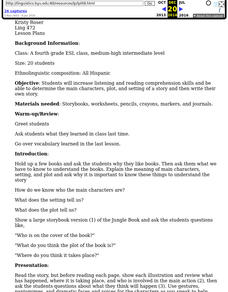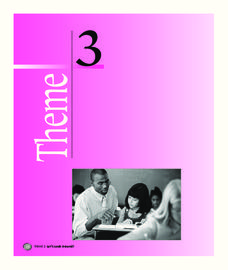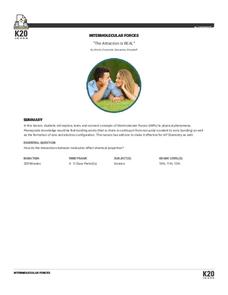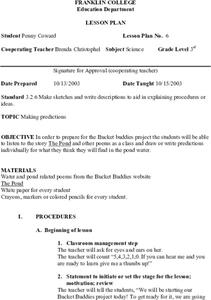Curated OER
What Do You See at the Pond?
With What Do You See at the Pond?, young readers explore pond life and practice reading strategies. Learners first make predictions and then read the simple story independently. After a second read-through with a partner, kids come...
Curated OER
Summer of the Monkeys
While reading the book Summer of the Monkeys by Wilson Rawls, the class ties together the core reading objectives, which are making predictions, comprehending new information, reading for author's purpose, independence in reading,...
Curated OER
Language Practice
The simple instructional techniques described in this plan will help young readers learn and practice basic reading skills and strategies. Before reading, introduce your readers to the meaning of main character, setting, and plot. Then...
K20 LEARN
The Parched Plains: Weather And Climate
How do meteorologists differentiate between droughts and dry spells? Introduce the concepts of weather forecasting and prediction with an insightful research-based lesson from the K20 series. Partners synthesize individual research from...
Curated OER
The Five Senses - Observation, Experimentation, Prediction, and Categorization.
First graders engage in this creative and well-designed activity. They rotate through five learning stations, each devoted to one of the senses. They practice observation, experimentation, prediction, and categorization.
Houghton Mifflin Harcourt
Let’s Look Around!: Challenge Activities (Theme 3)
Let's Look Around! is the theme of a unit that offers a plethora of challenge activities. Enhance your scholars' learning experiences and reinforce concepts with activities such as writing a book about farm animals, an...
Reed Novel Studies
Tales of a Fourth Grade Nothing: Novel Study
Many turtle species can retreat their heads into their shells when threatened by predators. With the Tales of a Fourth Grade Nothing novel study, pupils conduct research to uncover other interesting turtle facts. As they explore Judy...
Columbus City Schools
Totally Tides
Surf's up, big kahunas! How do surfers know when the big waves will appear? They use science! Over the course of five days, dive in to the inner workings of tidal waves and learn to predict sea levels with the moon as your guide.
Curated OER
Predictable Powers
Students use prior knowledge, the title, cover, and illustrations to make predictions about a story. They record their predictions on a Story Impression Worksheet, listen to the story, and check their predictions.
Curated OER
The Rest of the Story
Third graders make predictions about the story "The True Story of the Three Little Pigs" based on background knowledge. They read the story, stopping to verify or reject predictions. They write their own opinionated fairytales.
Seussville
Oh! the Places You'll Go!
Honor Dr. Seuss on his birthday with a read aloud of the story Oh! the Places You'll Go! and a variety of activities that inspire scholars to dream of their future endeavors. Readers take part in conversations, research the...
K20 LEARN
The Attraction is REAL
How attractive is your intermolecular forces lesson plan? Draw your class in with an activity that includes research, presentation, and demonstrations. Chemistry scholars work together to create claims about the each intermolecular...
Curated OER
Making Predictions
Third graders develop predictions in preparation for a "Bucket Buddies" pond water project. They listen to the book "The Pond" and discuss the different life forms in the pond from the book. Students then read online poems, and draw a...
Curated OER
Decision Making
Students study weather patterns and learn to make decisions based on the weather. In this weather lesson, students plan a potluck based on the weather. Students use a decision tree to brainstorm about the activity. Students complete a...
NASA
Future Temperature Projections
No one knows what the future will bring, but it's likely to be warmer than before. Pupils first learn about the NASA GISS ModelE2, a global climate model, and about representative concentration pathways that estimate the global output of...
Curated OER
The Furry News: How to Make a Newspaper
Students investigate the process of making a newspaper using children's literature to create context for the lesson. The readers are asked to predict the events of the story as it is read to them. Then the teacher uses guided questions...
Curated OER
Chilling Predictions
Learners research and prepare an almanac on the Arctic. They examine the laws that attempt to provide jurisdiction over this area and consider how these laws be affected if geography of the Arctic continues to change due to global warming.
Houghton Mifflin Harcourt
Surprise!: Challenge Activities (Theme 2)
Surprise! is the theme of this series of challenge activities. The surprise comes from the information your scholars will discover when researching topics such as alligators and crocodiles, living in other countries, becoming a...
University of Kentucky
The Great Spider Debate
Poor, misunderstood spiders! They are feared, disrespected, and detested by many people, yet they do so many positive things. A great addition to any insect unit, learn about some of the more common spiders, while hopefully dispelling...
National Wildlife Federation
When It Rains It Pours More Drought and More Heavy Rainfall
Which is worse — drought or flooding? Neither is helpful to the environment, and both are increasing due to climate change. The 16th lesson plan in a series of 21 covers the average precipitation trends for two different climates within...
Council for Economic Education
What Do People Want to Wear?
Who doesn't love fashion, especially when it can be applied to economics, supply, demand, market trends, and price equilibrium. Curious young consumers examine market scenarios to determine their effect on the demand and price for...
Curated OER
Things Aren't Always What They Seem
Students use video and the Internet to make predictions, draw conclusions, determine conflict and point of view while reading a short story. In this short story analysis lesson, students watch a related video and complete a prediction...
Curated OER
Do You Feel Lucky?
Young scholars calculate simple probabilities using mathematics then roll dice to test their predictions.
Curated OER
Hoot: KWHL
How can we help endangered animals? Learn about which animals are endangered and what people can do to protect them with a lesson based on Carl Hiaasen's Hoot. After completing a KWHL chart to note what they already know and what...























